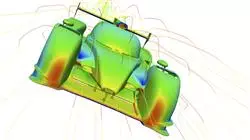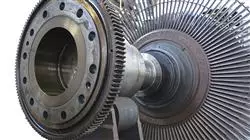University certificate
The world's largest faculty of information technology”
Introduction to the Program
Potencia tus habilidades y adquiere nuevos conocimientos sobre Fluidos Compresibles o Descomposición de Dominios, gracias a la mejor universidad online del mundo según Forbes, gracias a TECH”

La Dinámica de Fluidos Computacional es una herramienta importante en múltiples ámbitos como el de la industria aeroespacial, en la que la precisión y la eficiencia son fundamentales. Estudiar técnicas de CFD es esencial para los informáticos, ingenieros y diseñadores que desean crear sistemas más eficientes y optimizados.
Por esa razón, TECH ha diseñado un Postgraduate certificate en CFD Techniques for Predesign and Analysis con el que busca dotar a los alumnos de las habilidades y competencias necesarias para poder ejercer su labor como especialistas, con la máxima eficiencia y calidad posibles. Así, a lo largo de este programa se abordarán aspectos como las Técnicas de Paralelización, las Estructuras de Turbulencia o la Aplicación a un Problema de Fluidos.
Todo ello, a través de una cómoda modalidad 100% online que permite al alumno organizar sus horarios y sus estudios, compaginándolos con sus otras labores e intereses. Además, esta titulación cuenta con los materiales teóricos y prácticos más completos del mercado, lo que facilita el proceso de estudio del alumno y le permite alcanzar sus objetivos más exigentes de forma rápida.
Conviértete en un experto en CFD Techniques for Predesign and Analysis en unas semanas y con total libertad de organización”
Este Postgraduate certificate en CFD Techniques for Predesign and Analysis contiene el programa educativo más completo y actualizado del mercado. Sus características más destacadas son:
- El desarrollo de casos prácticos presentados por expertos en Técnicas de CFD para prediseño y análisis
- Los contenidos gráficos, esquemáticos y eminentemente prácticos con los que está concebido recogen una información deportiva y práctica sobre aquellas disciplinas indispensables para el ejercicio profesional
- Los ejercicios prácticos donde realizar el proceso de autoevaluación para mejorar el aprendizaje
- Su especial hincapié en metodologías innovadoras
- Las lecciones teóricas, preguntas al experto, foros de discusión de temas controvertidos y trabajos de reflexión individual
- La disponibilidad de acceso a los contenidos desde cualquier dispositivo fijo o portátil con conexión a internet
Potencia tu perfil profesional en una de las áreas con mayor futuro del ámbito de la informática, gracias a TECH y a los materiales más innovadores”
El programa incluye en su cuadro docente a profesionales del sector que vierten en esta capacitación la experiencia de su trabajo, además de reconocidos especialistas de sociedades de referencia y universidades de prestigio.
Su contenido multimedia, elaborado con la última tecnología educativa, permitirá al profesional un aprendizaje situado y contextual, es decir, un entorno simulado que proporcionará una capacitación inmersiva programada para entrenarse ante situaciones reales.
El diseño de este programa se centra en el Aprendizaje Basado en Problemas, mediante el cual el profesional deberá tratar de resolver las distintas situaciones de práctica profesional que se le planteen a lo largo del curso académico. Para ello, contará con la ayuda de un novedoso sistema de vídeo interactivo realizado por reconocidos expertos.
Profundiza en los Métodos Espectrales y las Técnicas de Visualización desde la comodidad de tu hogar y a cualquier hora del día"

Accede a todo el contenido sobre CFD y Supercomputación desde tu Tablet, móvil u ordenador"
Why study at TECH?
TECH is the world’s largest online university. With an impressive catalog of more than 14,000 university programs available in 11 languages, it is positioned as a leader in employability, with a 99% job placement rate. In addition, it relies on an enormous faculty of more than 6,000 professors of the highest international renown.

Study at the world's largest online university and guarantee your professional success. The future starts at TECH”
The world’s best online university according to FORBES
The prestigious Forbes magazine, specialized in business and finance, has highlighted TECH as “the world's best online university” This is what they have recently stated in an article in their digital edition in which they echo the success story of this institution, “thanks to the academic offer it provides, the selection of its teaching staff, and an innovative learning method aimed at educating the professionals of the future”
A revolutionary study method, a cutting-edge faculty and a practical focus: the key to TECH's success.
The most complete study plans on the university scene
TECH offers the most complete study plans on the university scene, with syllabuses that cover fundamental concepts and, at the same time, the main scientific advances in their specific scientific areas. In addition, these programs are continuously being updated to guarantee students the academic vanguard and the most in-demand professional skills. In this way, the university's qualifications provide its graduates with a significant advantage to propel their careers to success.
TECH offers the most comprehensive and intensive study plans on the current university scene.
A world-class teaching staff
TECH's teaching staff is made up of more than 6,000 professors with the highest international recognition. Professors, researchers and top executives of multinational companies, including Isaiah Covington, performance coach of the Boston Celtics; Magda Romanska, principal investigator at Harvard MetaLAB; Ignacio Wistumba, chairman of the department of translational molecular pathology at MD Anderson Cancer Center; and D.W. Pine, creative director of TIME magazine, among others.
Internationally renowned experts, specialized in different branches of Health, Technology, Communication and Business, form part of the TECH faculty.
A unique learning method
TECH is the first university to use Relearning in all its programs. It is the best online learning methodology, accredited with international teaching quality certifications, provided by prestigious educational agencies. In addition, this disruptive educational model is complemented with the “Case Method”, thereby setting up a unique online teaching strategy. Innovative teaching resources are also implemented, including detailed videos, infographics and interactive summaries.
TECH combines Relearning and the Case Method in all its university programs to guarantee excellent theoretical and practical learning, studying whenever and wherever you want.
The world's largest online university
TECH is the world’s largest online university. We are the largest educational institution, with the best and widest online educational catalog, one hundred percent online and covering the vast majority of areas of knowledge. We offer a large selection of our own degrees and accredited online undergraduate and postgraduate degrees. In total, more than 14,000 university degrees, in eleven different languages, make us the largest educational largest in the world.
TECH has the world's most extensive catalog of academic and official programs, available in more than 11 languages.
Google Premier Partner
The American technology giant has awarded TECH the Google Google Premier Partner badge. This award, which is only available to 3% of the world's companies, highlights the efficient, flexible and tailored experience that this university provides to students. The recognition as a Google Premier Partner not only accredits the maximum rigor, performance and investment in TECH's digital infrastructures, but also places this university as one of the world's leading technology companies.
Google has positioned TECH in the top 3% of the world's most important technology companies by awarding it its Google Premier Partner badge.
The official online university of the NBA
TECH is the official online university of the NBA. Thanks to our agreement with the biggest league in basketball, we offer our students exclusive university programs, as well as a wide variety of educational resources focused on the business of the league and other areas of the sports industry. Each program is made up of a uniquely designed syllabus and features exceptional guest hosts: professionals with a distinguished sports background who will offer their expertise on the most relevant topics.
TECH has been selected by the NBA, the world's top basketball league, as its official online university.
The top-rated university by its students
Students have positioned TECH as the world's top-rated university on the main review websites, with a highest rating of 4.9 out of 5, obtained from more than 1,000 reviews. These results consolidate TECH as the benchmark university institution at an international level, reflecting the excellence and positive impact of its educational model.” reflecting the excellence and positive impact of its educational model.”
TECH is the world’s top-rated university by its students.
Leaders in employability
TECH has managed to become the leading university in employability. 99% of its students obtain jobs in the academic field they have studied, within one year of completing any of the university's programs. A similar number achieve immediate career enhancement. All this thanks to a study methodology that bases its effectiveness on the acquisition of practical skills, which are absolutely necessary for professional development.
99% of TECH graduates find a job within a year of completing their studies.
Postgraduate Certificate in Course on CFD Techniques for Predesign and Analysis
Computational Fluid Dynamics (CFD) is a powerful tool for the prediction and analysis of fluid behavior in different contexts. Numerical simulation of fluids has become a key tool in the design and analysis of systems and processes involving fluids. At TECH Global University we have this specialized program designed with the objective of developing the necessary skills to carry out accurate and reliable numerical simulations. It is an excellent option for those who wish to acquire specialized skills and develop a successful career in this field.
Finite volume simulation is a popular technique for solving the Navier-Stokes equations in Computational Fluid Dynamics. The flow domain is divided into finite cells that are assigned a point in three-dimensional space, with a pressure, velocity and temperature. A mathematical model is chosen to describe the flow properties and the equations are solved in each cell using numerical algorithms. Finally, the results are analyzed and compared with known conditions to verify the accuracy of the simulation. In our undergraduate course you will learn about numerical simulation of fluid flow (CFD) using the finite volume method.







